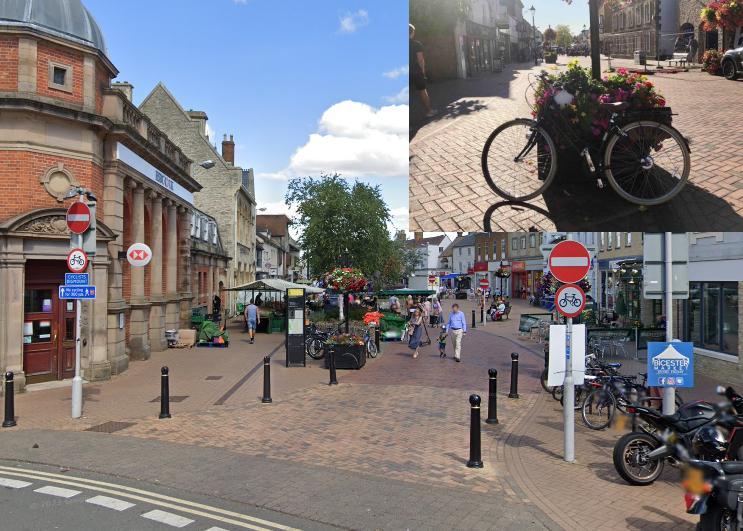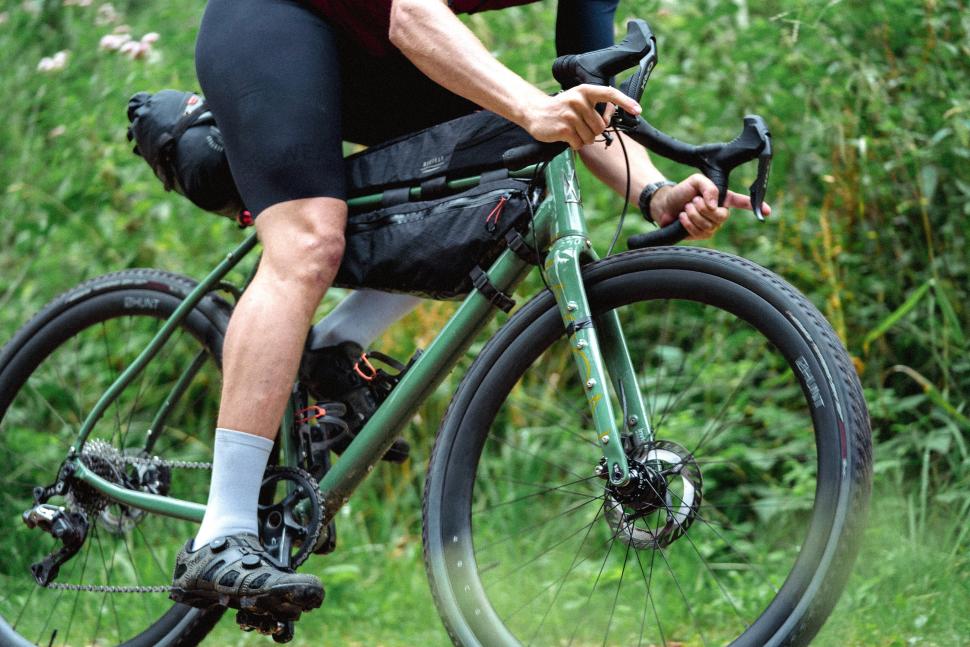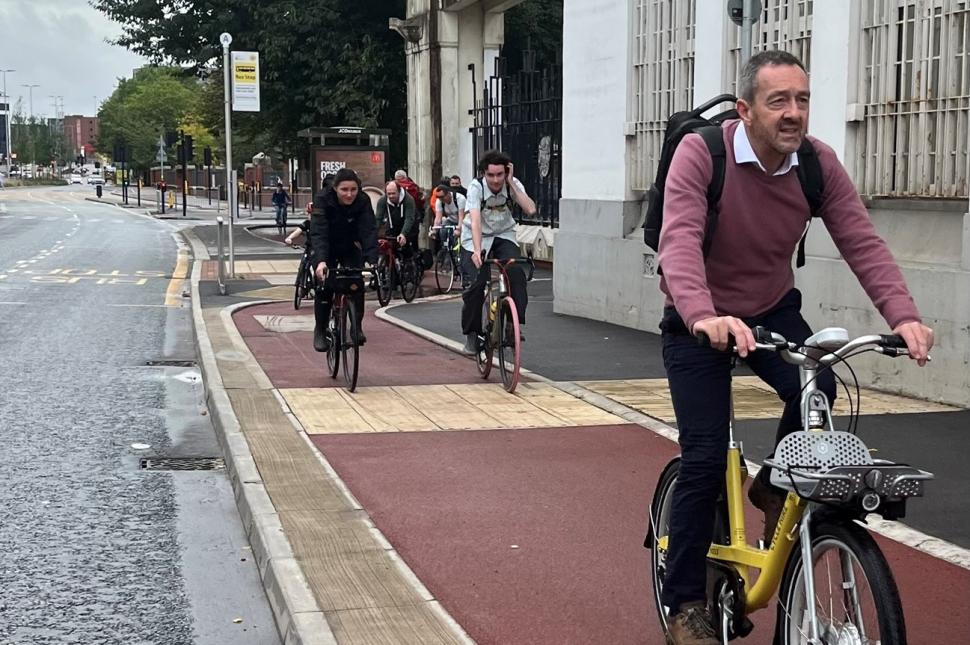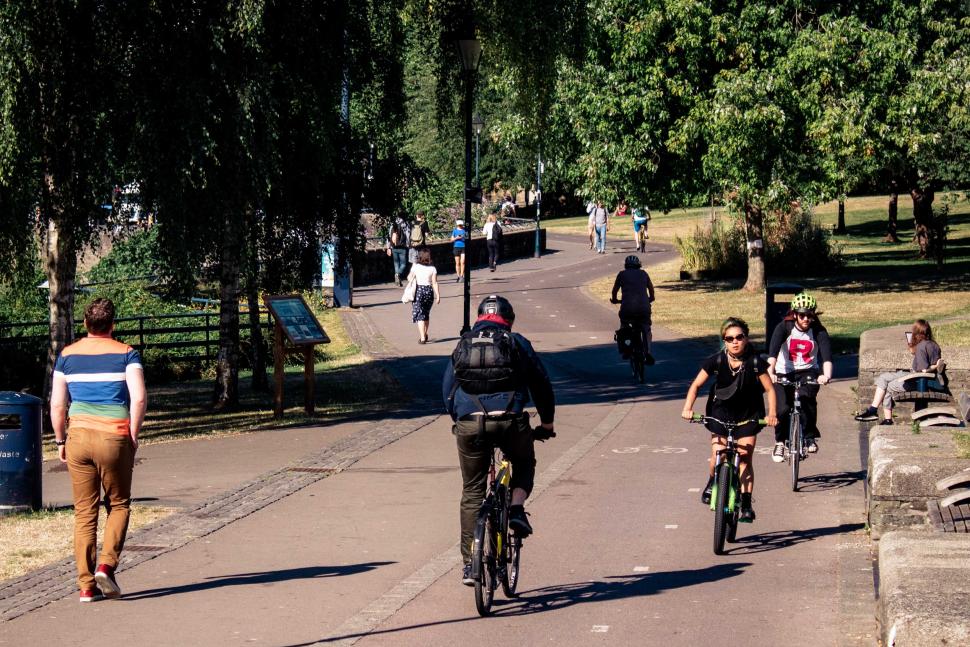- News
- Reviews
- Bikes
- Accessories
- Accessories - misc
- Computer mounts
- Bags
- Bar ends
- Bike bags & cases
- Bottle cages
- Bottles
- Cameras
- Car racks
- Child seats
- Computers
- Glasses
- GPS units
- Helmets
- Lights - front
- Lights - rear
- Lights - sets
- Locks
- Mirrors
- Mudguards
- Racks
- Pumps & CO2 inflators
- Puncture kits
- Reflectives
- Smart watches
- Stands and racks
- Trailers
- Clothing
- Components
- Bar tape & grips
- Bottom brackets
- Brake & gear cables
- Brake & STI levers
- Brake pads & spares
- Brakes
- Cassettes & freewheels
- Chains
- Chainsets & chainrings
- Derailleurs - front
- Derailleurs - rear
- Forks
- Gear levers & shifters
- Groupsets
- Handlebars & extensions
- Headsets
- Hubs
- Inner tubes
- Pedals
- Quick releases & skewers
- Saddles
- Seatposts
- Stems
- Wheels
- Tyres
- Health, fitness and nutrition
- Tools and workshop
- Miscellaneous
- Cross country mountain bikes
- Tubeless valves
- Buyers Guides
- Features
- Forum
- Recommends
- Podcast
news
Why don't cyclists use the cycle lane? Because it's like a "BMX track"; "It's a rough sport, but this was not an accident": Vuelta crash controversy rumbles on; Boardman talks declining cycling distance stats; Must-have tools + more on the live blog
SUMMARY
 "BMX track" cycle lane (Rory McCarron/Twitter)
"BMX track" cycle lane (Rory McCarron/Twitter)29 August 2024, 15:10
Why don't cyclists use the cycle lane? Because it's like a "BMX track"
Cycling lawyer at Leigh Day and road.cc regular Rory McCarron spotted some people complaining about cyclists riding in the road when there was a cycle lane (of sorts) right there, a cardinal sin in the book of society's most easily annoyed...
We say "of sorts" because, as Rory pointed out in his post, there appears to be part of a "BMX track" randomly stuck in, potentially because of a driveway on the left, although the angle makes it quite hard to see. Needless to say, it did apparently cause plenty of "people on Facebook complaining these road cyclists are not using" it, as well as these ones about Rory's "BMX track" assessment too...
"Looks like a cycle calming scheme to make cyclists slow before the crossing. Probably been some complaints about cyclists not stopping for pedestrians," one comment came. I guess it's just as well there's a pedestrian-calming hump too to prevent complaints about pedestrians not stopping for other pedestrians.
"Roads have speed bumps pal. What's the issue with cycle lanes having them?" another asked.
Incredible patience from Rory on display to reply explaining that speed bumps would require "proper design and signage", which, well, this bump/lump/jump is certainly lacking. The consensus seems to be that this is from Ireland, the "awful engineering" on display another fairly well agreed upon point among those not most concerned by... CYCLISTS IN THE ROAD!
Pretty sure the first one is ... pic.twitter.com/1I11v0u2dz
— Callum (@rapiddescentsco) August 29, 2024
There's a cycle lane near me that's actually pretty good but has speed bumps (raised crossings possibly more accurate) at the extreme end of the scale, the ones that have a flat top for a couple of feet then drop down the other side. I've actually grown to quite like them as you can click down a gear on top and steal a bit of momentum on the way down. Not like this one admittedly. Try to roll your momentum over one of these and you'd probably find yourself somewhere near the ozone layer.
29 August 2024, 16:48
Underdog victory for Pablo Castrillo at La Vuelta, as GC favourties take well-earned day off
29 August 2024, 16:43
Allowing "speeding" cyclists to ride on "struggling" high street would lead to "carnage" and "frighten" elderly, say traders opposed to lifting cycling ban in pedestrianised shopping area
29 August 2024, 16:24
Para-cycling silvers won on opening day of Paris Games for ParalympicsGB
The velodrome action at the Paralympics got underway today, ParalympicsGB already with two silver medals on the board. Kadeena Cox, a major gold medal hope, was not one of them however, the six-time Paralympic medallist wobbling out of the gate and crashing in her women's C4-5 500m time trial.
Instead it was Daphne Schrager who won Great Britain's firt medal of the 2024 Paralympics in the track cycling, taking silver in the women's C1-3 3000m individual pursuit.
Not long after, the second medal was delivered, Steve Bate and pilot Chris Latham winning silver in the men's B 4000m individual pursuit final.
29 August 2024, 14:37
A more sustainable future for the bike industry? Hunt introduces recyclable carbon fibre to new gravel wheelsets and plans to implement tech more widely "over time"
29 August 2024, 14:28
Ben O'Connor speaks out about Richard Carapaz crash
Speaking to the TV cameras ahead of the stage, a smiling Ben O'Connor was very patient with the inevitable questions debriefing yesterday's crash drama, the Australian again insisting his teammates did nothing wrong and also explaining that conversations with EF took place and there is "zero animosity".
"I really think we did absolutely nothing wrong," he told Eurosport's TV coverage. "We've spoken to EF together and everything is clear and it was absolutely zero animosity. Geoffrey [Bouchard] really did absolutely nothing. So, I don't really understand the sanctioning between all the other boys in my team as well because we didn't do anything wrong.
"Yeah, he [Carapaz] may have hit the pedal or the wheel, but my teammate did not move at all. He was there on the left, he didn't swing left, he was just riding. So, I don't think it's very fair to be honest."
If only that blasted tree hadn't been in the way of the helicopter shot...
29 August 2024, 13:19
Evans Cycles set to open two new stores as brand aims to become "go-to destination for cycling", just weeks after reporting £22.8m loss and slashing bike prices in 70% sale
29 August 2024, 11:48
Mr Motivator and other celebrities join #BreakTheCycle campaign ahead of World Suicide Prevention Day
Together with mental health charity Beder, e-bike brand Volt is launching the #BreakTheCycle campaign to raise awareness about the importance of good mental health, using the power of cycling to make an impact. The campaign is challenging the public to 5.284km each which, if 10,000 do, will see a collective distance of 52,840km ridden, the numbers in memory of the 5,284 people in England who took their lives last year.
Mr Motivator, artist Stuart Semple and LBC presenter Natasha Devon have joined the campaign, along with live blog favourites Travis & Sigrid. It is hoped the 52,840km target will be hit by World Suicide Prevention Day on 10 September. Participation is simple, with riders logging their ride on the #BreakTheCycle custom Strava page.
"Mental health struggles are one of the biggest issues facing society today, and with cycling scientifically proven to help, we're excited to continue our work with Beder and get the important message out further with this new challenge," Volt co-founder James Metcalfe said. "We want to drive positive action across the UK, raise awareness about these vital issues, get more people active, and show them you can have fun while doing it. I hope everyone in the UK can join us and help #BreakTheCycle around mental health."
29 August 2024, 11:04
"We get what we build for, so let's start building something better": Chris Boardman reacts to cycling distances falling to lowest levels in a decade
Reacting to the news in the last post, Active Travel Commissioner Chris Boardman called the decline an "unsurprising dip" and urged policy makers to "start building something better".
"A sadly unsurprising dip in today's stats," Boardman wrote on social media. "We've been building health out of streets and baking pollution in. It's a road we can't afford, that takes us to a place we don't want to live. We get what we build for, so let's start building something better."
29 August 2024, 11:03
"UK's transport system is broken and stacked against poorest in society": Government urged to quickly deliver on its active travel promises after official figures reveal average cycling distances have fallen to lowest levels in a decade
29 August 2024, 10:08
"We want to create a bridge between prison and life outside and give people a second chance": Prison bike shop opens
Changing the Cycle, a bike shop run by the Oswin Project charity and based in the grounds of HMP Northumberland will give prisoners and prison leavers bike maintenance training in the hope of giving "people a second chance".
The charity hopes it will help people with criminal records find employment, training and support, the BBC visiting to hear how it is hoped three people will be allowed to work in the shop at any one time, rotating every six months.
"All the prisoners tell us the one thing they need most when they get out is a job," the shop's manager James Teasdale, who will also train staff said. "We want to create a bridge between prison and life outside and give people a second chance. Many people who leave prison end up going back inside because they have so few opportunities to build a new life for themselves."
The shop will operate by accepting donations of pre-loved and unwanted bikes from the public that will then be refurbished and repaired before being sold on.
29 August 2024, 09:11
Your must-have tools (and some amusingly relatable comments about bike maintenance)
You might have seen Emily's tools feature on the site this week...
Well, I thought I'd share some of your thoughts on the discussion starter, not least because a couple almost made me spit out my coffee. Very relatable indeed...
jaymack: "Don't forget a mobile phone so you can call your local bike shop from the privacy of your garage to organise an emergency appointment to sort out the mess you've just made of your pride and joy."
PRSboy: "Also useful for enthusiastically watching a video about the job you're about to do, then revisiting forlornly when surrounded by springs, ball-bearings and a mystery washer which you can't recall where it came from."
Yep, that sounds familiar. Interestingly, roboito suggested the "greatest investments" he made in the maintenance department weren't tools, but actually a couple of cheap second-hand bikes...
"The first one, a folder needed new tyres, tubes and chain. I was OK with tyres but the rest was new to me at the time. The next bike was a big old hybrid for carrying a child seat, needed the same as the folder, a new freewheel and wheel bearings. This was another jump for me. These bikes were important and in regular use so needed to work when I wanted them to but I wasn't as worried about having a go at working on them in the same was as I was on my more expensive road bike. They allowed me to build confidence, knowledge and skill without worrying about destroying my pride and joy."
Nice. And any excuse for a couple more bikes is always a win...
We'll also point you in the direction of a thread on the road.cc forum where plenty of you have been sharing your go-to tools.
29 August 2024, 08:51
Cyclist lucky to escape uninjured after near miss with falling tree during Wisconsin storm
Scary footage from the US city of Milwaukee where a doorbell camera captured the moment a tree fell during a storm, the cyclist riding along the street unable to react in time and crashing into it. The owner whose camera filmed the incident thankfully reported the rider was seen getting up and didn't appear to be injured.
29 August 2024, 07:32
"It's a rough sport, but this was not an accident": EF boss accuses Vuelta leader's team of deliberately causing Richard Carapaz crash, as Ben O'Connor deletes Twitter account after slamming UCI warning
Big drama at La Vuelta yesterday evening, the fallout from Richard Carapaz's crash rumbling on and turning into everyone's favourite form of post-stage analysis — social media outrage.
Accidents happen in cycling. We all know that. It’s a rough sport. But this was not an accident: pic.twitter.com/0PorhVlASy
— Jonathan Vaughters (@Vaughters) August 28, 2024
The EF Education-EasyPost climber's crash was caught by the TV cameras with around 93km to go, Carapaz seen picking himself up and quickly getting back on the bike, a replay (frustratingly blocked by a tree at the crucial moment) showing the moment he fell from his bike having left the road. Why the rider, who dropped to fourth on GC, fell was a matter his team boss Jonathan Vaughters had an opinion on, taking to social media and sharing the footage with the caption: "Well, that was pretty mean."
Just 20 minutes later he shared a slightly longer video again, this time saying: "Accidents happen in cycling. We all know that. It's a rough sport. But this was not an accident."
The tree blocking the footage makes it hard to say if it was just a touch of wheels or something worse, although EF's team boss is fairly confident in his take on events. Race leader Ben O'Connor is fairly confident in his too, the Decathlon–AG2R La Mondiale rider posting three minutes after Vaughters, and wrote: "We never tried to cause a crash, and never pushed someone off the road."
O'Connor's Twitter account has since been deleted, the Aussie climber's post also addressing the fact the UCI gave yellow cards to four of his teammates (Victor Lafay, Cyril Dessel, Bruno Armirail and Geoffrey Bouchard) for obstructing the road, the team spreading across the road in order to prevent more riders joining the breakaway.
It's fairly standard practice and while Decathlon–AG2R La Mondiale may feel unfairly singled out for something that has gone unpunished more times than it's worth remembering, the fact is the UCI rules state it is an offence, namely: "Obstruction by a rider or vehicle in order to prevent or delay the movement of another rider or vehicle."
Plenty pointed this out to O'Connor during last night's social media discussion, the team not getting much sympathy from fans watching on. O'Connor tagged the UCI in his post and asked: "What kind of dangerous move do you think my teammates Bouchard, Lafay and Armirail [did] that merited a yellow card? The road was blocked by us, like in every race after the breakaway leaves. We never tried to cause a crash, and never pushed someone off the road."
The answer to O'Connor's question is likely the six words that begin his second sentence, although the team will probably still have questions about the consistency of enforcement of the 'blocking' rule considering, as O'Connor pointed out, they're far from the only team to have ever spread out across the road at the head of the peloton.
Quite amusingly, given all the drama elsewhere, Decathlon–AG2R La Mondiale's social media admin summarised their team's day out as: "After a splendid job by the team to filter out the breakaway, Ben was unfortunately just a hair's breadth away from finishing the last climb with his rivals for the Red Jersey. He gives back 37s to Primož Roglič."
Needless to say, there were more than a few people responding to that post too...
Dan is the road.cc news editor and joined in 2020 having previously written about nearly every other sport under the sun for the Express, and the weird and wonderful world of non-league football for The Non-League Paper. Dan has been at road.cc for four years and mainly writes news and tech articles as well as the occasional feature. He has hopefully kept you entertained on the live blog too.
Never fast enough to take things on the bike too seriously, when he's not working you'll find him exploring the south of England by two wheels at a leisurely weekend pace, or enjoying his favourite Scottish roads when visiting family. Sometimes he'll even load up the bags and ride up the whole way, he's a bit strange like that.
Latest Comments
- dave atkinson 6 min 25 sec ago
we were SO lucky with the weather on this one. i've done the butt buster a month later in temperatures that never got above freezing
- Eccentricbiker 23 min 35 sec ago
I have a bell, but it's of no use, nor is any other audible warning device, when many pedestrians have earphones on/in and are oblivious to what's...
- brooksby 55 min 21 sec ago
Except, as I said earlier, the Fentons claim that the border officers in France and the UK also missed this kid. And they're professionals,...
- SecretSam 1 hour 1 min ago
The lefty fork. Answering a question no-one asked...
- Hirsute 1 hour 4 min ago
Some armed bloke was shot by the white house in the last few days. I'm surprised zelenskyy didn't lay him out !
- Shades 2 hours 9 min ago
In addition to my steel road bike, I got a titanium gravel bike built last year; really fancied a 'signature bike' and the bike mechanic I use was...
- spasypaddy 2 hours 13 min ago
nice extension can be found if you google for it that allows you to download a GPX which can then be loaded into Strava's mapping tool to then push...
- chrisonabike 3 hours 49 min ago
What are you, some kind of authoritarian* Communist?...
- quiff 4 hours 48 min ago
I'd say just 4 reverting is a good result; they haven't just been steamrollered by public pressure. Of those, I know 3 well and agree that 30 is...
















Add new comment
19 comments
Well done Steve Bate! Amazing man, not only five Paralympic medals now (two golds, two silvers and a bronze) but has climbed the fearsome El Capitan in Yosemite three times, including being the first visually impaired person to climb it solo. Never met him but feel an affinity as I own his one-time road bike: I still keep his name sticker on it to remind me not to give in to health limitations.
The "bump" is an optical illusion. It's actually a gully about 0.5" deep that's been painted to look like a great big ramp to stop pedestrians tripping in it. It's quite convincing though. The painters did a good job.
Even if it was totally flat I wouldn't ride it, too many driveways, not enough separation from pedestrians. It's safer on the road even among the idiots driving
Indeed. The first time (and last for many years) I used one, a motorist decided to drive onto it just in front of me, so I ended up falling off and breaking my arm.
Might help if some of their employees didn't appear to be actively trying to prevent people cycling by rendering their bikes unrideable.
POLICE OUR STREETS
The reason why cycle very little on the roads now is because of the following experiences with:
Reckless speeding drivers
Distracted phone/infotainment drivers
Drugged/drunken drivers (recently witnessed driver inhaling NOx)
Thuggery from car passengers/moped/motorbike riders knocking cyclists over
Armed violent bike jackings.
Providing a few more miles of cycle lanes will do nothing to sort out the perils listed above.
Only a massive reversal in the decline in roads policing will sort out these issues.
I'm with you on "cycle lanes". In fact almost everywhere cycling has stopped declining or even grown separate cycle paths (where motor traffic is heavy / fast) and improved junctions have been shown to be "necessary, if not sufficient". That's in addition to motor traffic volume and speed reduction across our "streets" to ensure that where we need cyclists to share with drivers it works.
The reason "we" (cyclists) cycle very little on roads may be, but the reason "we" (UK population) don't is ... a bit more complicated, I think you'll find.
Highly incomplete summary: where it's easy to drive we'll drive, out-group, inconvenient / not obvious this be an "improvement" to my life, "unsafe" (multiple ways).
For one - the raw statistics show that cycling is very safe in terms of KSIs. I agree this doesn't speak to "I thought I was going to die".
Looking the other way round you'll certainly find variable policing but all of the above issues in places like NL, Scandinavia, Seville ... and even lesser cycling places like Germany (a rather mixed story for mass cycling!) and even Paris. And yet they're all generally well above most places in the UK in terms of fraction of journeys cycled.
FWIW lots of UK surveys (salt cellar at ready...) have people citing "safety". I suspect this is ultimately a proxy for "doesn't feel / look like it would feel safe or stress-free". (I think "convenience" and "socially acceptable" / "status-maintaining or enhancing" / "pro-social activity" enter in here). There are multiple types of "safety" to consider also.
Given the UK has (to us) a LOT of "low hanging fruit" of obvious road offenses / police not responding to "open and shut" cases AND there has been a drop in police per head of population for some time ... it may seem "obvious" that "police it better" will "fix the roads". Again a long and complex story but see reasons above, and also that I think people seriously underestimate the cost it would take for "dramatic" improvements (we're talking the entire criminal justice system).
Why has cycling adopted a field sports disciplinary system, and not a racing one? It makes no sense at all. Time penalties, including a stop-go, etc would be better, not cards......
All sorts of non-neutralising incidents could make that unfair - not to mention that they will have to then fight back to the peloton expending more energy.
I'm sticking to sitting on the fence until we see how it affects racing long term.
Also, bike racing is very different to motor racing. An F1 style punishment system wouldn't work.
Stop-go penalties wouldn't work because if a penalty was rescinded on appeal after the day's racing just taking the minute or whatever a rider had been penalised off their time wouldn't compensate for the additional energy that rider would have had to spend getting back to the peloton after the penalty. The penalty card system was introduced to stop riders simply accepting time penalties for illegal behaviour when they made no difference; outside the GC contenders it doesn't really matter to most riders if they have a few minutes deducted, whereas the threat of being thrown off the race and being unable to support their leader for two yellow card offences is one they will have to take seriously.
Didn't we used to dock race time as a penalty for racing rule breaking ?
I think the issue here is the yellow card system is too vague, it applies to all manner of rule transgressions, some more safety critical than others.
But like F1 if the people handing out the penalties aren't consistent it causes alot of problems.
If blocking the road, which is against the rules is a yellow card now, apply it everytime it happens. But we know they won't, hence O'Connors valid complaint
Yes indeed, but as I mentioned it made no odds to anyone except GC contenders, if you're a domestique expected to lose hours in the mountains what do you care about a 10 minute penalty?
Maybe the best solution would be to start hitting directeurs sportif with financial penalties instead of riders, I reckon team orders might change pretty quickly then.
Docking race time fails unless support rider who offends has every rider on their team, including leader, docked enough to affect team leader's position in race. It's a team sport, as we keep insisting. Otherwise end up with football's approach of 'taking one for the team'
You could dock it off the team classification. That would be effective against Movistar anyway...
It's standard practice to issue fines, but the yellow card thing is new, and potentially more consequential. It seems like this is what O'Connor's complaining about - it's not that it's typically 'gone unpunished', but that the punishment here is higher, and one that's supposed to be more for dangerous actions, rather than just unsporting or technical infringements.
I feel sorry for AG2R on the fact they are the first team to be rightfully punished for a widely used illegal tactic. Hopefully, if the UCI remains consistent going forward, their complaints will soften over time.
No way the UCI is going to be consistent on this. Blocking is as old as the sport itself, and comes in many grades and guises. It would be a tough one to police, and the UCI have a history of making arbitrary judgements.
I honestly didn't know until now that it was banned, I can remember back in the day when La Vie Claire, Banesto etc would set up a "rolling roadblock" at the front of the peleton on narrow roads and it would be spoken of admiringly as smart tactics.
We'll see what happens once the likes of Visma or UAE do it.
Of course, being cynical I would say no action would be taken.